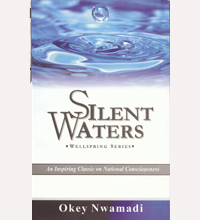In
his introduction to his novel, Silent Waters, Okey Nwamadi
explains that he wrote the book to ‘inspire good men and women
with a sense of nationalism’. It is a purpose that immediately
sets him up to fail in the fiction emporium, where readers pick
up books primarily to have a good read. Yet, some candour at the
outset is not a bad thing, because Silent Waters is inspirational
philosophy as well as faction in which the author strides through
his own text in chapter one.
Like Ali Mazrui’s The Trial
of Christopher Okigbo, this is fiction with a bone to pick.
Early Negritude writers saw their primary goals in the realm of
liberation literature. The art was always a vehicle for a higher
purpose, which purpose did not always preclude the emergence of
pretty good art. In the aftermath of the 2nd World War,
William Faulkner (in his 1949 Nobel acceptance speech) thought that
It is [the poet and the
writer's,] privilege to help man endure by lifting his heart,
by reminding him of the courage and honor and hope and pride and
compassion and pity and sacrifice which have been the glory of
his past. The poet's voice need not merely be the record of man,
it can be one of the props, the pillars to help him endure and
prevail.
Okey returns to this liberation reflex
to interrogate the rut in which his country – like tracts
of Africa – has been stuck since independence. But, where
early Negritude writers identify a manifest destiny in the Black
race, Okey’s lodestone is his Christian faith. Like Gabriel
Okara’s totemic items of nature, this author employs the recurrent
tropes of silence, rock and water to elaborate his philosophy throughout
the book which premises the regeneration of nation upon a regeneration
of family.
In Silent Waters, Soetan returns home after a difficult day at work. He is restored
by family and bath, following which he and wife, Tokunboh, listen
to a newscast of a girl that plotted her own abduction to raise
a ransom from her rich father. This evidence of the collapse of
family values is the backdrop of the following day’s meeting
of ‘the parliament’.
The ‘parliament’ at the
core of the book is not the representative political assembly in
the traditional sense of the word. It is more of a support and self-help
fellowship that started with five married couples and grew, at the
start of the book, to fifty married couples who met under a large
tent. Most of the novel transpires under this tent. In the course
of the evening, the trend of the debate turns spontaneously political.
A series of speeches lay out a strategy for Leadership Renew,
a new socio-political movement. They resolve to pursue their dreams
and – in the last couple of chapters – their stirring
programme of social action sweeps the country. The first few outings
are wildly successful, but as the book closes, the crusaders have
to contend with some of hurdles that secular opposition figures
had faced before them.
Despite a substantial 254 pages, the
book is firmly within the pamphleteering tradition. Although most
of the action of the novel takes place in a meeting tent, the author’s
anecdotal style lends some pace to it. — The Christians at
the meeting are not ‘saints’ after all and they swap
with confessional zeal, stories of transatlantic infidelity and
salacious marital woes. These anecdotes leaven the set-piece debates
somewhat.
Although, there is a yawning need for
civic empowerment movements that cover Africa, say nothing of Nigeria,
the Christian approach to social action adopted by the author opens
itself to obvious criticism. The broad fragmentation of Nigeria
into Christian, Moslem, atheists and believers in traditional religions
are not likely to change dramatically, despite the massive evangelism
growing mainly in Nigeria’s southern states. A mass inspiration
philosophy dressed in Christian clothes might only appeal to the
converted and the convertible, while alienating large geographic
and demographic regions. While there is room for Christian politics,
Christian national politics in Nigeria may yet be an oxymoron.
Yet, it is by no means a closed question.
The author, Nigerian writer, minister and NGO director, foresees
and addresses this issue in an argument between the crusaders and
the press, [p. 242] where a character asserts the difference between
‘Christian principle’ (which can have secular application
and appeal) and ‘Christian doctrine’ (which is religion
proper). He models the fictional movement, Leadership Renew, after Charles Finney’s evangelical social action
in America and the British Clapham set (which comprised William
Wilberforce, Glanville Sharp and others), which transformed the
moral fabric of 19th* century Britain by spearheading
a socio-political movement that attacked slavery and abysmal factory
conditions with Wesleyan fervour.
Whichever way this argument pans out,
the importance of this book is the platform it opens in the religious
centre of the Nigerian middle class, a largely self-aggrandizing
sphere of influence obsessed with a prosperity gospel and generally
closed to self-critical conversation. It attacks the class dimension,
the self-serving religion of Nigerian evangelism, reaching for a
more South American model of Christian activism; in the words of
a character, Pastor Charles,
People join certain fellowships
for material or social networking. In some churches, this class
hype is encouraged and structures put in place to perpetuate them.
Is it any surprise that a lot of Christians today lack the virtue
of compassion which is a prerequisite for social action? (p.201)
If Silent Waters inspires this precinct of the Nigerian burg, the book would
have been well worth the writing.  |











![]()
![]()
![]()
![]()

